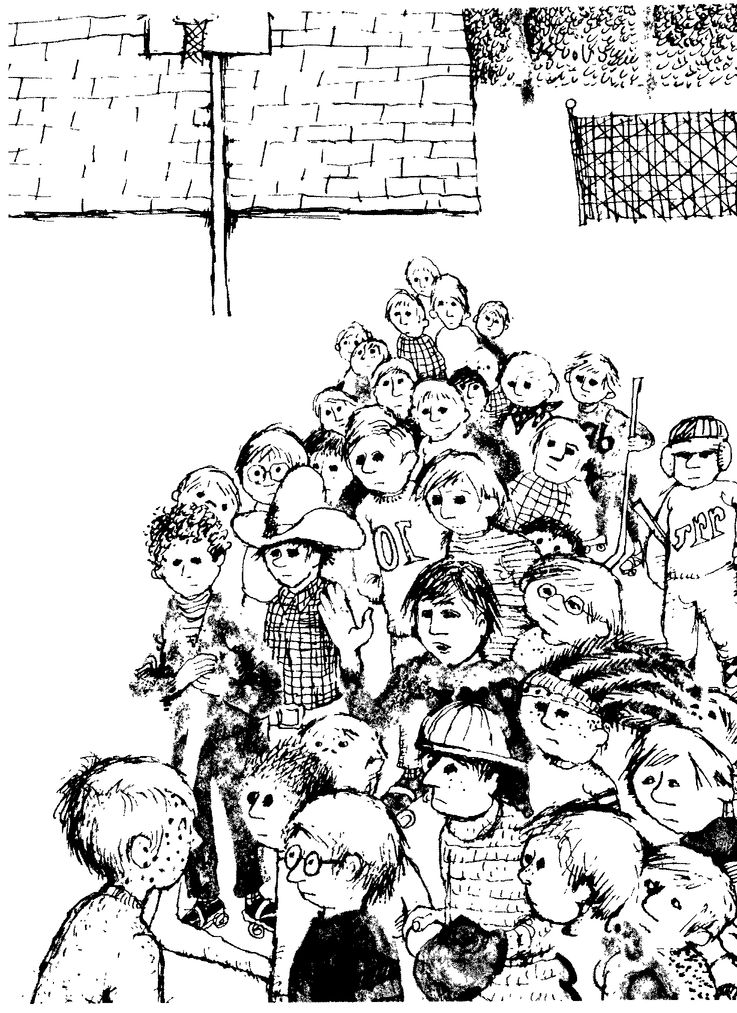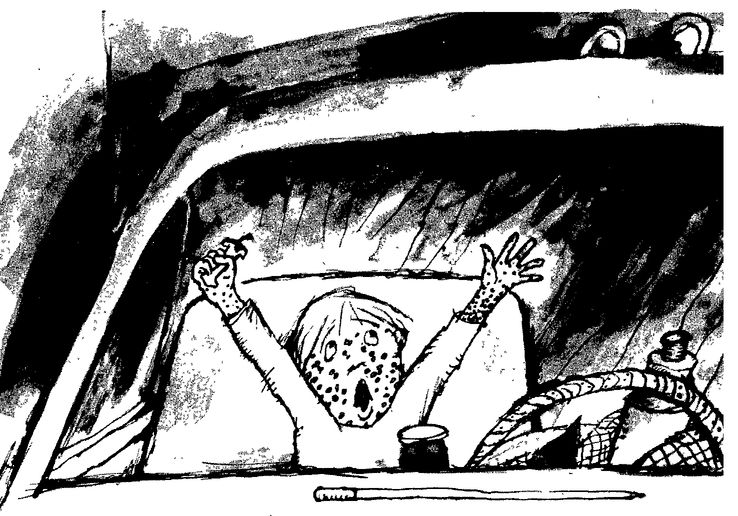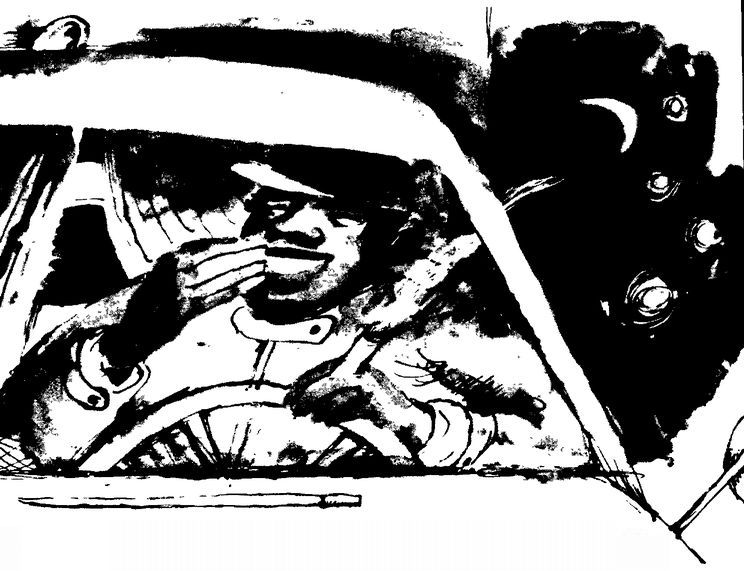Chocolate Fever (4 page)
Authors: Robert Kimmel Smith

The gang stopped closing in on Henry.
“Oh, yeah?” said the big boy. “You expect us to believe that?”
“I don’t care whether you believe it or not,” Henry said.
“You’re bluffing.”
“Bluffing?” Henry said, “touch me and you’ll find out if I’m bluffing. I have Chocolate Fever, one of the most horrible and catching diseases in the world.”
“Chocolate Fever?” echoed the big boy. “You’re making it up.”
Henry could see that he had the crowd on the run. “Chocolate Fever is the worst disease ever discovered on earth,” he said. “You know what happens if you get Chocolate Fever? Your whole head swells up. Your mouth gets dry. You break out in big chocolate spots—like me. You begin to look . . . ugly. And then the really bad stuff begins.”

The boys were listening closely now. And the circle around him was beginning to widen as the gang started to back away.
“He’s making it up, fellas,” Big Boy said. “Don’t listen to him.” But the boys were listening all right and believing every word. Henry began to walk toward the boys. As he did, they made way for him. Slowly, a path opened, giving him room to get by.
“I don’t want you to die,” Henry said as he passed through the ring of boys, “so you’d just better let me be on my way.”
None of the boys tried to stop him. Even Big Boy, as Henry passed close by, made no move to touch him.
Just as Henry neared the outer ring of boys, he heard one of them exclaim: “Hey! I know who he is. I heard it on the radio when I came home from school. There’s a kid who ran away from a hospital this morning . . . and the police are looking for him. His name is Henry Green.”
Big Boy called out as Henry kept walking, “Is that you, kid? Are you Henry Green?”
“Henry Green?” Henry called back over his shoulder. “Never heard of him.”
Just the same, as soon as he was clear of the schoolyard, Henry broke into a run and didn’t stop until he had left the gang far, far behind him.
Chapter 8
Mac
THE TRUCK THUMPED AND RUMBLED along the superhighway, its powerful headlights cutting a yellow slice through the blackness. “Are you all right up there, kid?” the driver called.
From the sleeping bunk set up high in the cab of the big diesel Henry answered, “Right, Mac, I’m okay.”
Okay,
Henry thought bitterly,
sure I’m okay. I don’t have a friend in the world, I look like some sort of side-show freak, the police and doctors and my folks and heaven knows who else is after me, and I don’t know where I’m going. If that’s being okay, then I’m okay.
Henry thought bitterly,
sure I’m okay. I don’t have a friend in the world, I look like some sort of side-show freak, the police and doctors and my folks and heaven knows who else is after me, and I don’t know where I’m going. If that’s being okay, then I’m okay.
He had stood out on the highway for a long time and watched the day turn into dark. Hundreds of cars and trucks had swept by without stopping. But Mac had stopped and offered him a lift. That was hours ago, and they had come a long way. Henry didn’t know how many miles they had traveled or where they were heading, and what’s more he didn’t care.
He was sure that Mac had not seen his spots. It had probably been too dark to notice them.
No one in his right mind would have anything to do with me,
Henry thought.
Not once they got a look at these stupid big brown spots. Even Mac, nice as he seemed, wouldn’t have taken a chance if he had seen me clearly.
No one in his right mind would have anything to do with me,
Henry thought.
Not once they got a look at these stupid big brown spots. Even Mac, nice as he seemed, wouldn’t have taken a chance if he had seen me clearly.
“Hop in,” Mac had said, “the weather’s fine,” a big grin crossing his friendly face. He was a huge black man dressed in dirty coveralls. His truck was clean and warm, and Henry didn’t hesitate. After sitting alongside Mac for an hour or so in the front seat, Henry had climbed up to the bunk and fallen quickly asleep. He didn’t know how long he had slept, but he felt rested now.

Mac turned the big truck off the highway and onto a service road. Slowly, he shifted down through the gears and, braking gently, brought the huge trailer to a stop.
“Hey, kid,” he called. “Come on down here.”
Henry climbed down to sit beside Mac.
“Suppertime,” Mac said. “Now just as soon as I get the lights on—”
“I like the dark,” Henry said quickly.
“You what?”

“I like the dark,” Henry said as the lights came on. Henry blinked at the sudden brightness.
He’s
seen me now,
he thought.
He’s
seen me now,
he thought.
Mac reached down below his seat and brought up a big picnic basket. He placed it between them on the seat.
“Now let’s just see what that woman gave us for supper,” he said.
“It’s all right,” Henry said. “I’ll get off here.”
“Huh?”
“I won’t make any fuss,” Henry said. “I’ll just go quietly.”
“You are a strange one, kid,” Mac said. “Now what are you talking about?”
“Well, you must see these big brown spots all over me by now . . .”
Mac nodded. “Yeah, -I see them.” He began looking through the picnic basket. “You like ham and cheese?”
“I’m willing to go,” Henry began.
“Maybe chicken spread? We got chicken spread, too. And I do believe . . . yes, by heavens, tuna fish.”
“I mean,” Henry began again, “if you don’t want to have anything to do with me, I’ll understand. I really will.”
“What’ll it be?” Mac asked. “Tuna, chicken spread, or ham and cheese?” He was looking squarely into Henry’s face, smiling ever so slightly.
“Tuna,” Henry said after a moment, taking the sandwich Mac handed him.
“Glory be, we eat at last,” Mac said.
Henry gobbled the tuna sandwich in nothing flat, then went on to dispose of a ham and cheese, an apple, a piece of raisin cake, and half a thermos bottle of milk.
There was chocolate cake, too, but Henry declined it. Somehow, it didn’t appeal to him.
When they had finished eating, Mac settled back and lighted a cigar.
“Mac,” Henry said, “isn’t there something you want to ask me?”
“Sure, but I figure you’re about to tell me what I want to know.”
“Well,” Henry began, “I have this disease called Chocolate Fever. That’s what these big brown spots are all over me—chocolate. And nobody, especially a doctor named Fargo, knows what to do about it. So I’ll probably have these spots on me for the rest of my life and—”
“And that’s why you’re running away,” Mac said.
“I have to run away,” Henry said. “I look so terrible and ugly.”
“I wouldn’t say ugly,” Mac said. “Unique, maybe.”
“What’s that?”
“Sort of special.”
“But how can I live this way? I’m a freak, a chocolate freak!”
“Easy now,” Mac said, “calm down.”
“People will be looking . . . staring at me. How can I live with people staring at me?”
Mac chuckled softly. He looked away from Henry.
“How would you like it, Mac, if people stared at you?”
“You know, kid, I’ve had some experience in that line myself,” the big man said quietly.
“You mean people stare at you?”
“Uh-huh,” Mac said. “When you’re black, and most of the other people are white, that’s bound to happen.”
“Gee, Mac,” Henry said, “I’m sorry.”
“Oh, it’s nothing personal, kid. Besides, by the time I was your age I’d gotten over it. But you know, getting stared at—and some other things—got me thinking: If there’s so many white people, and so few black people, why that kind of makes
me
unique.”
me
unique.”
“You mean special?”
“Exactly right. So all that staring and stuff, what it did was make me proud. You know, black is beautiful.”
“That’s okay for you,” said Henry, “but white with big brown spots all over is ugly.”
Mac put his hand to his mouth and coughed. For a moment, Henry thought he might be laughing.
“Okay, youngster,” he said, “have it your own way. Just tell me, where are you going? What you figure on doing?”
“I’m just running away, Mac. And I don’t know what I’m going to do.”
Mac thought about that for about a second and a half. “Just flat out running away, huh? Things get too much for you, so you cut out? Brilliant.”
“I won’t go back,” Henry said. “I just won’t.”
“Okay, then, you won’t go back. But let me ask you something: You got a mother?”
“Yes.”
“Father?”
“Yes.”
“They been good to you?”
“Yes.”
“Don’t beat up on you?”
“Of course not.”
“Don’t make your life miserable?”
“No.”
“So they’re pretty good parents, right?”
“Right.”
“And you love ’em cause they’re so kind and good, right?”
“Yes.”
“Well, how do you think they feel right now? Wondering where you could be, are you all right? Are you dead, maybe? Yes, sir, you sure are treating them mean. Why, it wouldn’t surprise me if your mother was crying her heart out right now. Just sick to death with worrying about you.”
“But, Mac—”
“Now you hush till I’m finished with what I got to say. A good child respects his parents, yes, sir! A good child don’t cause his parents heartache or grief or worry. No, sir!”
Henry didn’t try to say anything, but he was listening very carefully.
“Now here’s
my
plan, kid. First thing we do is drive down this road till we get to a telephone. Then we call your folks so they can stop worrying.”
my
plan, kid. First thing we do is drive down this road till we get to a telephone. Then we call your folks so they can stop worrying.”
“I’m not going back to that hospital,” Henry said firmly.
“We’ll tell that to your folks, too. Maybe there’s someplace else you can go . . . some other doctor who can take care of you.”
“I like that idea,” Henry said.
“Who knows?” Mac continued. “Maybe this chocolate fever of yours will go away. Maybe you’ll just wake up tomorrow and it’ll all be cured.”
“I hope so,” said Henry, “but I don’t think so.”
“Anyway, first thing we do is call your folks. Okay?”
Henry smiled. There was something about the way Mac spoke that made him feel better.
“How about it?” Mac asked. “Should we go find that telephone?”
“What are we waiting for?” Henry said.
Chapter 9
Hijacked
MAC DOUSED THE CAB LIGHTS and reached for the switch that would start the diesel. But at that very moment, a loud voice from the darkness outside the truck called “Reach for the sky! Don’t make a move! Hands up! We got you covered!”
Mac froze at the wheel. Henry’s heart leaped up in his throat, ricocheted around, and settled back down in his chest again.
Two men jumped up onto the truck, one on each side. Each man carried a small blue revolver. The guns were pointed straight at Mac.
After a moment, Mac found his voice. “What is this?” he asked.
The man on Mac’s side of the truck, the one with the mustache, replied. “This, sir, is a robbery. A stickup. A hijacking, in fact. Section Three, Part Four of the Criminal Code. Seizure of a cargo of goods from a vehicle or vessel on the roads or waterways.”
“Oh,” said Mac.
“Right, Louie,” said the man on Henry’s side of the truck. He was the smaller of the two thieves, and instead of a mustache, he wore hornrimmed glasses and a lopsided smile. “I’m Lefty, he’s Louie,” the man went on. “People get us mixed up sometimes, but I don’t know why.”
Other books
Shadow of a Life by Mute80
A Woman of Courage by J.H. Fletcher
Complete Works, Volume III by Harold Pinter
The Runes of the Earth: The Last Chronicles of Thomas Covenant - Book One by Stephen R. Donaldson
Death Sentence by Brian Garfield
My Sweet Isabella (The Ambassador Trilogy #3) by Mia Villano
Nothing Special 03 - Here Comes Trouble by A.E. Via
A Soldier' Womans by Ava Delany
Disgraced Cowboys (Lone Wolves of Shay Falls 3) [Siren Publishing Ménage Amour] by J. Rose Allister
Tallchief for Keeps by London, Cait